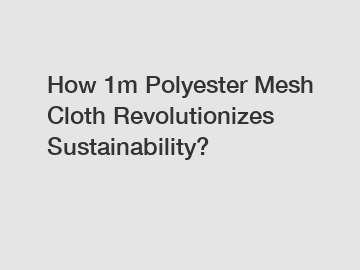Key Questions to Ask When Purchasing Recycled Polystyrene Plastic Granules for Your Projects
With competitive price and timely delivery, EcoPlas sincerely hope to be your supplier and partner.
Understanding Your Project Needs
Before purchasing recycled polystyrene plastic granules, it's essential to assess your project requirements. This involves understanding the specific applications, structural needs, and performance criteria of your project.
Define the Application
Start by identifying what you intend to use the recycled polystyrene for. Will it be used for insulation, packaging, or manufacturing new products? Understanding the application can help narrow down the right specifications.
Determine Quality Standards
Different projects may require varying quality levels. Clarify any industry standards or certifications your project must meet. This ensures that you choose granules that comply with necessary regulations, such as ISO or ASTM standards.
Evaluating Suppliers
Once you understand your project needs, it's time to assess potential suppliers of recycled polystyrene plastic granules.
Check Supplier Reputation
Research the suppliers you are considering. Look for reviews, testimonials, and case studies. Reliable suppliers often have a proven track record in delivering high-quality materials.
Inquire About Sourcing Practices
Understand where the recycled materials come from. Check if the suppliers have sustainable sourcing practices, as this can affect both the quality and environmental impact of the granules.
Analyzing Cost Factors
Cost is a critical factor when purchasing recycled polystyrene plastic granules, but it shouldn't be the only consideration.
Compare Pricing
Request quotes from multiple suppliers. While comparing, ensure that the quotes are for the same quality and specification of granules. This will help you make an informed decision based on overall value rather than just price.
Additional resources:Unlock Savings: Buy Recycled Polystyrene Granules Today!
Consider Long-Term Impact
How Do Different Types of Trailers Work?
Exploring Different Types of Hoses in 2024
How to Choose OEM Six Wire Spiral Hydraulic Hose?
Key Questions to Ask When Selecting a Premium Quality Six Wire Spiral Hydraulic Hose
How to Choose Steel Wire Braid Hydraulic Hose Cost?
Understanding DIN EN 856 4SH: Specs, Uses, and FAQs
Evaluate the total lifecycle cost. Sometimes, cheaper granules may lead to higher maintenance or replacement costs in the long run. Investing in quality materials can save money over time.
Sample and Test
Before finalizing your purchase, obtaining samples for testing is a prudent step.
Conduct Performance Tests
Test the samples under conditions similar to those of your actual project. This can help you assess whether the granules meet your specified requirements.
Assess Compatibility
Ensure that the recycled polystyrene granules are compatible with your existing processes and materials. This reduces the risk of issues during manufacturing or application.
Final Decision Making
After thorough evaluation of your options, compile all your findings to make a final decision.
Review Contracts Carefully
Before signing any agreement, review the terms and conditions in detail. Ensure that issues like delivery times, quality guarantees, and after-sales support are clearly outlined.
Establish Communication with Suppliers
Maintain open lines of communication with your chosen supplier. This can help address any issues promptly and foster a better working relationship moving forward.
The company is the world’s best recycled polystyrene plastic granules for sale supplier. We are your one-stop shop for all needs. Our staff are highly-specialized and will help you find the product you need.
Additional resources:How to Choose Hydraulic Steel Wire Braid Rubber Hose?
Top Trends in Fabric-Braided Hose for 2024
Is Your SAE 100 R16 Hose Meeting High-Pressure Demands?
100R17 Hydraulic Hose Specifications: Performance vs. Durability
Understanding SAE 100 R1 Hydraulic Rubber Hose
Discover the Benefits of Anti-Aging Polyester Mesh
Unlocking OEM EN856 4SP: Key Benefits and Insights









